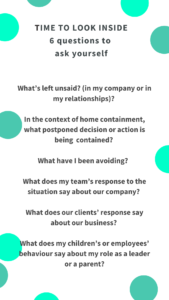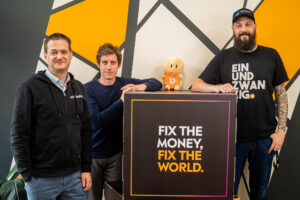Hero, Prisoner Or Phoenix: The Leaders’ Response To A Pandemic

Velina Getova is an organizational psychologist, performance coach and founder of NotYourTherapy.com. Her purpose is to change the perception of mental health in the workplace. She runs 1-on-1 sessions and groups in the business creating space for people to solve their challenges. Outside of work, she loves trаvelling, healthy cooking and advising startups in the community.
“Things change faster than I can think. How to deal with ambiguity? How to keep calm as I’m worried about my team members, my aging parents, our partners, and clients? What about the business, remote work, salaries? What is the right decision today?”
We’re all worried.
And it’s ok.
Especially as no one knows how long this period will last, or what the economic impact will be. That uncertainty can be extremely stressful and sets off a range of reactions, infecting even those who appear the strongest.
In psychoanalytic terms, there’s the Victim: “I’m forced to stay home, how come I can’t go to the park, the government is not taking good care.” There’s the Disqualifier: “Only old people die; I’ll be fine, so I see no point in all this fuss.” There’s the Crisis Cop, who buys all sanitizers and scrutinises others for not following the rules. There’s the Avoidant, who’ll withdraw, both physically and emotionally, and the Compensator who’ll overwork or engage in other excessive activity. Did you notice any of these in your own or others’ behaviours?
On top of that, each of our individual experiences live within the organizational and community ‘systemic’ reaction, where psychology meets systems thinking. Our initial stress response varies according to character, culture, social background, and previous trauma. Freelancers living alone may react differently to engineers looking after a family, new joiners in a team, experienced business leaders, or first-time founders.
There’s no shame in having anxiety or weird reactions. Practicing empathy can help us stop judging one another’s behaviour and choose a better response tomorrow.
Moving from reaction to response: it’s not the time to rush
We’re past the stage of panic or ignorance. Hopefully, everyone now remembers the value of good sleep, nutrition, and exercise.
Even the most negligent society members start following the safety measures, while startups and community leaders are running virtual collaborative spaces to hack the crisis. Corporations and individuals who have got the resources fuel the collective immune system with dopamine through generosity and volunteering.
In Bulgaria, we’re now in week three of lockdown, so we must face the new reality and spot opportunities for agility and adaptation. Operating in such circumstances creates tension between our instinct to act fast in familiar ways, and the time needed for more adaptive thinking.
Observing my own patterns, as well as talking to founders and leaders in the tech ecosystem, I’m witnessing the trend of manic working and innovating as a source of familiar comfort. Are we honest about our own defenses against the fear of losing the world we once knew?
Numerous blog posts advise on activities to keep us productive, connected, engaged. One of my clients was brutally honest: “Didn’t we have enough of that before the lockdown?”
It seems that the current crisis is sending a different message. As the English Buddhist teacher, Ajam Bram says: when everything falls apart and you don’t know what to do, then pause and look inside. Continue working and be of help, if you can, but don’t necessarily make stupid fast decisions. There’s an unmatched strength in being able to tolerate ambiguity.
In the case of a leader’s response to a global pandemic, that’s an opportunity to practice being with what appears unbearable. You can also clean up any business or relational residue so we can leave the lockdown as phoenixes, not prisoners.
Here’re a few ideas on how to do that.
Showing courage is not enough: go inside
Crisis calls for heroes. It’s not surprising that our ego ideal would be screaming – go outside, be brave, do a grander gesture.
The last 10 days gave a platform for new and known heroes to emerge. That’s admirable. They will probably save lives, provide jobs, and give hope. These heroes need to suspend their own anxiety and face the challenge while supporting their team, clients, and partners.
If you find you’re the hero, remember to give yourself permission to have your human needs met. Harness the support (even virtual) of peers in the community, business advisors, partners, or investors. Savor compassion and loving kindness from your close ones by allowing yourself to be hugged or amused.
Many heroes say they lead well in crises but don’t actually know how they do it. A real breakthrough happens in time of pause, not action. Double-loop learning occurs not in a fight, when energy is in the muscles, but in the moment of reflection and recovery. Hence, if life, as usual, is on pause, now’s a beautiful time for radical self-inquiry. Spend an hour alone, start writing or just observe your thoughts without judgement.
Learn about yourself by taking a different perspective. Identify key figures in your network and challenge your thinking from their perspective to see alternative business solutions. If you work from home, learn curiosity from your children or listen to the life stories of the elderly. Their wisdom is infinite. Even if we cannot hug them now, we can give them a sense of purpose if we hear their teachings.
Face your real issues and solve them. For good.
When entire cities are closed, the message to all of us couldn’t be more obvious:
Stay home and keep things clean. Practicing emotional hygiene can give fortunes to sustain a healthy organism.
Just like stress hormones such as cortisol shut down our immune system, unresolved interpersonal, work or emotional issues can shut down entire businesses or marriages. So, now is the time to clean up and nurture the soil to grow wonders afterwards.
Here are a few questions you can start with:

Use the power of emotional contagion
Emotion and energy spread beyond physical social distancing. As employees virtually engage with you and one another, their neural networks associated with the release of stress or joy hormones still get activated. These can both compromise and enhance our immune system.
What virus is spreading in your company right now?
Emotional intelligence is measured by the quality of our last conversation. Especially when working remotely for weeks, you can emotionally proof-read your writing to create a sense of calm and stability. Before sending an important email or chat message, re-read what you’ve written even by physically moving chairs. Is what you said what you want people to hear? At one gaming company, everyone collectively decided to drop loaded language like urgent or asap for a month.
Support your colleagues with presence, not overscheduling team activities. Martin Bjergegaard, the
ex-CEO of Danish startup Able shares how important it is to be mentally and emotionally present in virtual meetings. Pay attention to tones of voice, pauses, and facial expressions. If numbers are down, lean on storytelling and help employees to see progress daily.
Hold space for others to be vulnerable
Together with Puzl Coworking, we organize free Office Hours on Mental Health for all members of the community. I can see that in addition to health or money anxieties, there’s a lot of undersurface worry that is baseless but still distracts the team’s focus.
Stay curious and ask the team what bothers them to address work-related concerns within your or your company’s control. Questions about remote work, performance issues, how new joiners get onboarded, how colleagues can support others who get sick, etc.To encourage people to be open with one another the Camplight team, for example, start their meetings with a simple emotional check-in.
While many founders cannot offer certainty, you can offer validation of people’s feelings and concerns, address what’s actionable and relieve unnecessary tension. When you name a worry, you can feel it and move through it, not hook on it.
Help your people regain control by acting one day at a time:
- They can take breaks from work to order food.
- They can ask for flexible hours to support children studying at home.
- They can take a course if their project is on hold.





























